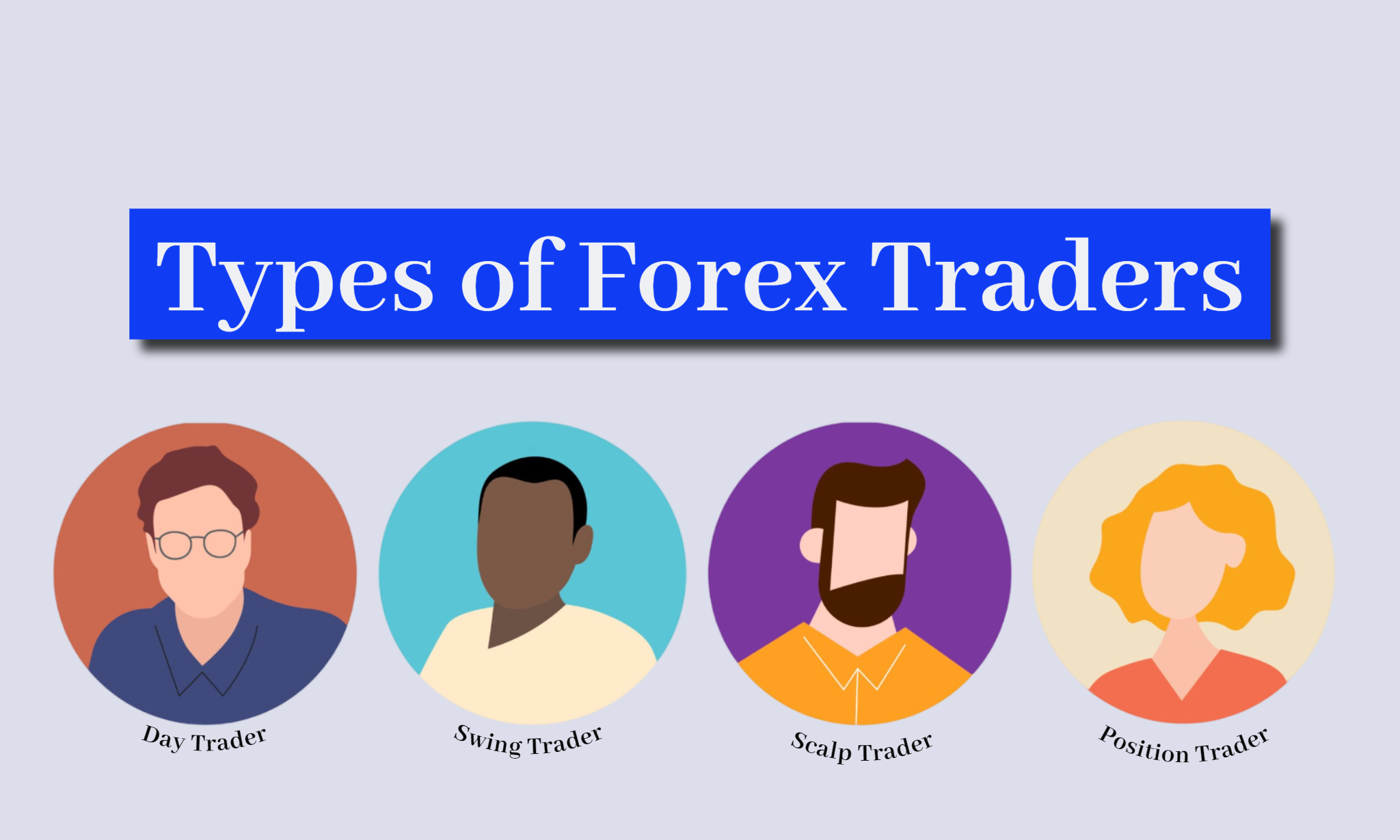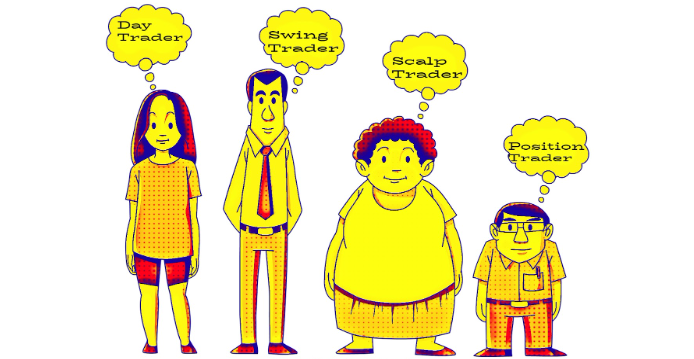
How many types of Forex traders are there? The Forex market has 4 main categories of traders. What makes them different? Which Forex trading style is best for you?
This article gives answers to these questions so that you can assess which one is the most suitable trading style for you.
There are four types of Forex traders and they are:
- The day trader
- The swing trader
- The scalp trader
- The position trader
4 main types of Forex traders explained

1# The Day traders
This category of Forex traders trades throughout the day. Such market participants do not hold their positions after the session has closed.
We have observed that day traders tend to earn very quickly. Day traders try to grab as much profit as possible precisely on small fluctuations, using short timeframes of 1-15 minutes for this. These professionals earn in the short term, not in the long term.
Their preferences are EUR/USD, GBP/USD, USD/JPY. These currency pairs are very volatile as their range reaches up to 100 pips, which is good for those who like to trade quickly but profitably.
Read also! How to Start Day Trading with $100
2# Swing traders
This type of Forex traders uses long trading periods. Swing traders will take positions ranging from a few hours to several days just to catch a reversal in the market. These types of traders monitor their charts throughout the day to find an opportunity to make a profit when they enter the market. They prefer to use technical analysis in their trading.
Swing traders give their preference to: the GBP/USD.
Read also! Is Swing Trading Profitable?
3# Scalp traders
Scalp traders use the trading style of buying and selling currency pairs (such as EUR/USD) within a very short time frame, from seconds to minutes. As with all other trading styles, scalpers participate in scalping by placing positions in anticipation of a change in value. Scalping trading involves both taking long positions (buying) and placing short positions (selling). These setups are then closed by performing the opposite action – a sell closes a long position and a buy closes a short scalping trade.
Scalp traders in this sense are not different from any other types of Forex traders, such as day traders or swing traders. The main difference is the time frame over which scalping trading is performed. Trading volume, trader intent and leverage applied are also critical factors that play a role in scalping trading.
4# Position traders
One of the distinguishing factors of a position trader is that they try to anticipate their prospects in the market. They will not control small fluctuations in the market, as the above-mentioned types of Forex traders would do, but will have a long term plan for everything.
Strategies for position traders take not just days and weeks, but whole months and even years. Of course, they, like everyone else, will follow price changes on Forex charts, but they will give most of their attention to long-term and fundamental opportunities. This type of Forex trader will constantly evaluate interest rates, government decisions, and countries’ economies before making a decision.
Read also! Who controls the Forex Markets?
As for currency pairs, the situation here is predictable: there are so many conclusions on absolutely any currency pair. We figured out what was happening, considered all the options and opened positions – this is the essence of trading position traders.
How are these Forex traders different?
Below is a summary table of what makes these 4 types of Forex traders different.
| Type of Trader | Time of Trade | Their Personality |
| Day Trader | Throughout the day | Alert and spontaneous |
| Swing Trader | Few hours to several days | Focus and Self-control |
| Scalp Trader | Seconds to minutes | Hasty and attentive |
| Position Trader | From days, weeks, months and years | Patient, decisive, and deliberate |
Other types of Forex traders
Besides the 4 main types of traders mentioned above, there are other types of traders with distinct strategies, mindsets, and sets of tools they use to make trading decisions.
5# Algorithmic Traders
Algorithmic traders, or “quants,” use computer programs and algorithms to execute trades. These algorithms are based on pre-defined criteria, technical indicators, and mathematical models. Algorithmic trading can be high-frequency or execute large block trades, depending on the strategy. It’s popular among institutional traders and hedge funds.
6# Technical Traders
Technical traders rely heavily on charts, technical indicators, and historical price data to make trading decisions. They believe that past price movements can predict future ones. Technical traders use tools like moving averages, RSI, and Fibonacci retracement levels to identify entry and exit points.
7# Fundamental Traders
Fundamental traders base their decisions on economic and geopolitical factors that affect a country’s currency value. They analyze economic data (e.g., GDP, employment figures), interest rates, political stability, and global events to predict currency movements. Fundamental trading often involves longer timeframes and can be less frequent than technical trading.
8# Event-Driven Traders
Event-driven traders focus on specific events that can trigger significant market movements, such as economic announcements, earnings reports, or geopolitical developments. They anticipate the impact of these events on currency prices and position themselves accordingly. Event-driven trading requires a keen understanding of market sentiment.
9# Hedgers
Hedgers use the Forex market to protect themselves against currency risk. They are often multinational corporations, importers, and exporters who want to safeguard against adverse currency movements. Hedging involves taking offsetting positions to minimize potential losses.
10# Copy Traders and Social Traders
Copy trading platforms allow traders to replicate the trades of experienced traders automatically. Social traders engage with a community of traders, sharing insights and strategies. These approaches are ideal for beginners or those who prefer a hands-off trading experience.
What makes these Forex traders different?
Below, we provide an overview of different types of Forex traders, highlighting what sets them apart and how they approach the Forex market. Understanding these trader categories can assist you in identifying your own trading style and goals.
| Type of Trader | Description | Approach |
|---|---|---|
| Algorithmic Traders | Utilize computer programs and algorithms for trading, often based on technical indicators and mathematical models. | High-frequency or block trading; favored by institutional traders and hedge funds. |
| Technical Traders | Rely on charts, technical indicators, and historical data to predict future price movements. | Focus on past price trends; use tools like moving averages, RSI, and Fibonacci levels. |
| Fundamental Traders | Base decisions on economic and geopolitical factors, such as GDP, interest rates, and global events. | Analyze long-term trends; consider economic data and political stability. |
| Event-Driven Traders | Focus on specific events (e.g., economic announcements) that can impact currency prices; anticipate market sentiment. | Position themselves based on event outcomes; require a deep understanding of events. |
| Hedgers | Use Forex to protect against currency risk; often multinational corporations and importers/exporters. | Take offsetting positions to minimize losses; focus on risk mitigation. |
| Copy Traders & Social Traders | Replicate experienced traders’ trades automatically or engage with a trader community. | Ideal for beginners and those seeking a more hands-off trading experience. |
Which Forex trading style is best for you?
There is no clear answer to this question because each of the types of Forex traders mentioned in this article has his own personality, trading strategies, and preferred time to trade.
So It doesn’t matter which category you belong to, but the important thing is that time periods are the main criterion for any strategy. Knowing the time will help novice traders achieve success, and professionals who combine all three categories will achieve amazing results in Forex trading.
